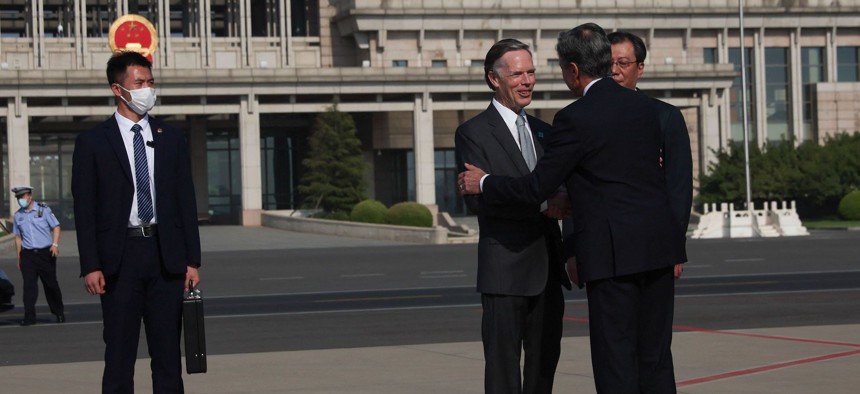Great job, US Embassy in Beijing

U.S. Ambassador Nicholas Burns welcomes U.S. Secretary of State Antony Blinken to China in June 2023. Burns is flanked by Yang Ta, Director General of the Department of North American and Oceanian Affairs of the Foreign Ministry. LEAH MILLIS/AFP via Getty Images
COMMENTARY | Steve Kelman cheers an Independence Day message that touted American-style freedom to a Chinese language audience.
On July 4, I received a message from a Chinese friend on the Chinese super-app WeChat. It was a video for the holiday from the US Embassy in Beijing. Entitled “What does freedom mean to me,” it presented the views of 11 Americans of varying genders, colors and native countries (some had foreign accents). Two of them delivered their statements in Chinese, the rest were in English with Chinese subtitles. (It was good news that the Embassy was allowed to share the video on WeChat.)
Some of the statements in the video expressed the view that freedom meant the ability to dissent, to be open and critical of what is going on in society. Freedom is “when people are speaking out in the public square, organizing, and demonstrating.” Freedom is “the opportunity to say what I think and to live according to my beliefs and values.” A number of the statements emphasized that freedom involves the right to be different. Freedom is the right “to live a life that is true to your identity, even if that identity is very different and challenges social norms.” Freedom is the ability to “raise my children according to my own personal values.” Freedom means “to give people the opportunity to be what they want to be, without doing harm to others.” Another said, “Freedom means I can live life openly as a gay man and express my love for my husband publicly.”
This was a great job by the embassy. When I read official Chinese media, they try to take ownership of the word “democracy.” They talk a lot about China having a shared economic prosperity that they then associate with democracy. But Chinese media never talks about freedom. We own that word. And we are owning something of value. People sometimes suggest that traditional Confucian culture in China, with its emphasis on obeying those above, puts little emphasis on freedom. In fact, the Chinese word for freedom (siyou) is the 400th most common word used in the Chinese language – surely not as high as it would be in the U.S., but not trivial. Most of my Chinese friends associate the U.S. with freedom, and that association is a positive one.
Freedom is a source of what is often called America’s “soft power.” This is power that comes on the international stage not from our weapons or our troops, but from our ideas.
At the end of the video, Ambassador (and Harvard colleague) Nick Burns appeared to state that freedom was “what Americans celebrate and cherish on July 4.” This appealed enough to my Chinese friend that he shared the video with me.
The Fourth of July provides a good opportunity to remind ourselves that this is what we stand for in the world.


